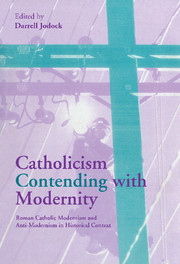 Catholicism Contending with Modernity
Catholicism Contending with Modernity Published online by Cambridge University Press: 30 October 2009
In France, and to a lesser degree in Germany and Italy, philosopher Maurice Blondel (1861–1949) is considered a major figure in the revitalization within Roman Catholicism at the beginning of this century. An intellectual deeply committed to his faith, Blondel was convinced that contemporary experience demanded a rethinking of the problem of God. He found the prevailing patterns of rationalist philosophy indifferent to ultimate human destiny. He also regarded the static understanding which characterized the dominant Catholic theology of his day to be less well suited for expressing God's presence to human destiny than the historical character of life and thought, brought out by modern philosophy, psychology, and intellectual experience. Blondel's approach to transcendence in the modern world through his monumental study of action marked a significant shift in Catholic responses to modernity.
His ideas on the openness of the human person to a supernatural destiny, many of which bore fruit in the Second Vatican Council, are no longer considered radical. In fact his influence within the Catholic world has been quietly unobtrusive. Yet as it engages the tension between philosophical reason and Catholic faith, Blondel's thought retains a certain boldness. This essay explores how the multiple contexts within which Blondel labored shed light on his contribution to modernity. They perhaps also illumine tensions among late twentieth-century Catholic Christians, as the church still struggles with the questions he raised.
To save this book to your Kindle, first ensure [email protected] is added to your Approved Personal Document E-mail List under your Personal Document Settings on the Manage Your Content and Devices page of your Amazon account. Then enter the ‘name’ part of your Kindle email address below. Find out more about saving to your Kindle.
Note you can select to save to either the @free.kindle.com or @kindle.com variations. ‘@free.kindle.com’ emails are free but can only be saved to your device when it is connected to wi-fi. ‘@kindle.com’ emails can be delivered even when you are not connected to wi-fi, but note that service fees apply.
Find out more about the Kindle Personal Document Service.
To save content items to your account, please confirm that you agree to abide by our usage policies. If this is the first time you use this feature, you will be asked to authorise Cambridge Core to connect with your account. Find out more about saving content to Dropbox.
To save content items to your account, please confirm that you agree to abide by our usage policies. If this is the first time you use this feature, you will be asked to authorise Cambridge Core to connect with your account. Find out more about saving content to Google Drive.